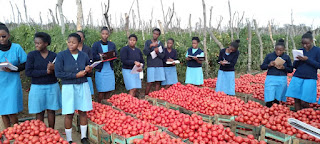Chipembi Girls Champion Climate Smart Agriculture
By Linda Mupemo
Climate change is one of the greatest challenges countries are facing world over.
Its adverse effects ranging from droughts, floods, food insecurity and water scarcity affect women and men disproportionately.
Women and girls face a greater challenge of coping with the harsh impact of climate change because of social and cultural factors which make them lack access to information and resources on climate change resilience.
According to a report by the United Nations (UN) Women which was launched at the 28th meeting of the Conference of the Parties (COP28) to the United Nations Framework Convention on Climate Change (UNFCCC), climate change may push up to 158 million women and girls into poverty by 2050.
The report further indicates that 232 million women and girls are likely to face food insecurity due to the situation.
This calls for increased programmes whose objective is to build the capacity of women and girls to adapt to changing climatic conditions.
Chipembi Girls' Secondary School in Chisamba District is one of the institutions championing climate resilience among young girls in Zambia .
What started as an initiative aimed at equipping its learners with information on sustainable food production systems has resulted in the learning institution establishing itself as a knowledge hub for agroecology and other climate smart agriculture practices in Central Province and beyond.
Located 28 kilometers away from Chisamba Central Business District, the school is well known for being the first ever Girls’
Secondary School in Zambia.
The school which was founded in 1926 is run by the United Church of Zambia (UCZ).
Apart from being the pioneer of girl child education in the country, the school has gained popularity for its sustainable agricultural activities.
On 16th October, 2023, Chipembi Girls’ School became the first secondary school in the country to host the World Food Day commemoration which was graced by heads of international organisations among them Food and Agriculture Organisation (FAO) Country Representative Suze Filippini and the United Nations Resident Coordinator Beatrice Mutali.
Further, during the 2023 Agriculture and Commercial Show held in Lusaka,
Republican President Hakainde Hichilema presented the school with the
prestigious Overall Champion in Beef Production Award, an award the school has
been scooping five years in a row.
 |
President Hakainde Hichilema presents Chipembi Girls Secondary School Head Teacher Albert Chituka with the Overall Champion in Beef Production Award at the 2023 Agriculture and Commercial show. Far left is Ngelenge Maliti, a pupil. Picture courtesy of Chipembi Girls' School Library.
The learning institution also won the Best School in Agriculture and Best Heifer Producer awards at the show. Additionally, it surpassed all the schools in Central Province as it was crowned the Best School in Agriculture at provincial level.
To add icing on the cake, during the 2023 59th Independence commemoration, Chipembi Girls’ Secondary School Head Teacher Albert Chituka was honoured by President Hichilema with the president’s insignia for meritorious achievement for his efforts in propelling the school to greater heights through the agriculture enterprise.
Noteworthy
is that the girls have been competing with seasoned commercial farmers and have
been emerging victorious, all the while maintaining their academic excellence
with the school having been recording a 100 percent pass rate for the past decade.
Chipembi
Girls’ Secondary School Head Teacher Albert Chituka says the school strives to
offer hands-on learning that exposes learners to real life experiences.
Mr.
Chituka describes what he refers to as the Chipembi Model as a vehicle
for producing well-rounded school leavers who are equipped with entrepreneurial
and agriculture skills necessary for one to be self-reliant in the wake of the high
rate of unemployment.
“Through our agriculture enterprise, we impart knowledge in our girls to enable them contribute to the growth of the economy since agriculture is one of the key drivers. By adopting climate smart agriculture practices, we are equally promoting sustainable development in our nation,” he narrates.
The
school has an integrated farming system that utilises produce from every unit
to ensure optimal utilisation of resources.
For
instance, chicken droppings from the poultry feed into the beef enterprise as
it is used as feed for animals. At the same time, animal waste is used to
fertilise vegetables and maize fields.
To improve soil fertility, the school keeps animals in a kraal for three years before shifting them to another location on the farm. While they are in the kraal, they defecate on the soil thereby enriching it with organic nutrients.
 |
| A cabbage field at Chipembi Girls' School farm |
“This
has helped us cut down on chemical fertiliser costs. We rely on organic manure
for soil fertility. Our crops are as organic as they come, we do not apply a
single grain of fertiliser to the soil,” Mr. Chituka says.
Mr.
Chituka states that the school agriculture enterprise uses less resources to
produce more and the money generated from the sale of the produce such as
tomatoes, maize and beef is used to run
the school whose enrollment rate is 639.
 |
| Chipembi Girls' School pupils selling tomatoes harvested from their farm |
 |
| Vegetables grown in water in a hydroponic at Chipembi Girls' School Farm |
Nontsikelelo
Saba, a Grade 11 pupil at the school is an Agriculture Science learner who has been
inspired to venture into agribusiness.
Through her participation in the production unit, Ms. Saba has learnt that not only does agriculture benefit producers but also consumers by feeding the nation.
Ms. Saba wants to be an agriprenuer and
grow crops that will help promote food security in the country.
“People associate agriculture with dirt. But when I see this dirt, I see money. It is high time we developed a positive attitude towards this essential sector,” she says.
Ms.
Saba called on her peers to consider taking up agriculture as a profitable
source of income.
Speaking
during his recent tour of the school farm, Minister of Education Douglas
Syakalima urged other schools to emulate Chipembi Girls’ School by transforming
their institutions into viable agriculture centers.
Mr.
Syakalima notes that quality education in Agriculture Science is key in
averting food insecurity in the country.
“By
engaging young learners in agriculture, we can foster a new generation of
farmers and agriprenuers who can lead the nation towards a more sustainable and
equitable food system,” he says.
Chisamba District Agricultural Coordinator (DACO) Belvin Muntanga commends Chipembi Girls' School Management for championing smart agriculture practices in the area.
Mr. Muntanga says the school has become a beacon of agriculture excellence where other farmers in the community go to learn sustainable agricultural practices.
Mr.
Muntanga notes that through the use of organic manure as opposed to chemical
fertiliser, the school is producing food in an eco-friendly manner.
He
explains that using organic manure for crop production improves the soil
structure thereby enabling it retain moisture. This is advantageous in the wake
of unpredictable rainfall patterns resulting from climate change.
Organic
farming equally lessens the greenhouse gas emissions hence combating global
warming.
“Organic farming plays a vital role in soil and environmental conservation. The use of animal manure and green compost enhances the health of crops, livestock and biodiversity,” he says.
As
the world strives to combat the adverse effects of climate change, adopting
sustainable agrifood systems is one of the solutions.
According
to a 2021 Chatham House report supported by the United Nations Environment
Programme (UNEP), the global food system is the primary driver of biodiversity
loss with agriculture being a threat to 24,000 of the 28, 000 species at risk
of extinction. The report further indicates that the global food system is a
major driver of climate change, accounting for 30 percent of total
human-produced emissions.
“We need to farm in a more nature-friendly, biodiversity-supporting way, limiting the use of inputs and replacing monoculture with polyculture farming practices,” the report reads in part.
Embracing sustainable agrifood systems is in line with the United Nations Sustainable Development Goals (SDGs).
Part three of SDG Number two reads in part; by 2030, ensure sustainable food production systems and implement resilient agricultural practices that increase productivity and production, that help maintain ecosystems, that strengthen capacity for adaptation to climate change, extreme weather , drought , flooding and other disasters and that progressively improve land and soil quality.
This feature article was also published in Times of Zambia newspaper.



This is a well written piece, the information it brings out gives inner peace, this is information I have never known .....
ReplyDeleteThank you so much Mr. Balengu.
DeleteThese are the minds we need to address challenges the Agriculture sector is facing. If Agriculture goes wrong nothing else will go right. All the best and well-done. Good and well researched write up.
ReplyDeleteThank you so much Mr. Nyirenda. You are right, agriculture is the backbone of Zambia's economy.
DeleteIt's well written 🙏🙏 and agriculture is the future because without it there is no future.
ReplyDeleteThank you so much.
DeleteYour project on tomato and cabbage cultivation is impressive and well-researched. The detailed approach to planting techniques, pest management, and crop care demonstrates a deep understanding of agricultural practices. Great job showcasing both the science and art of farming.
ReplyDeleteThank you Mr. Siame. The Chipembi Girls' School farm is indeed an agricultural marvel.
DeleteWell articulated agricultural concept and hope the stocking rate of animals is taken care of because if not well taken care of,too much urine from them may cause the Ph of the soil to decrease through Both the frequency and volume of urine excretion.
ReplyDeleteOtherwise,this is the only way to safeguard Our biodiversity.
Many thanks. Also, thank you for pointing this out, I will sure bring it to the attention of school authorities.
Delete